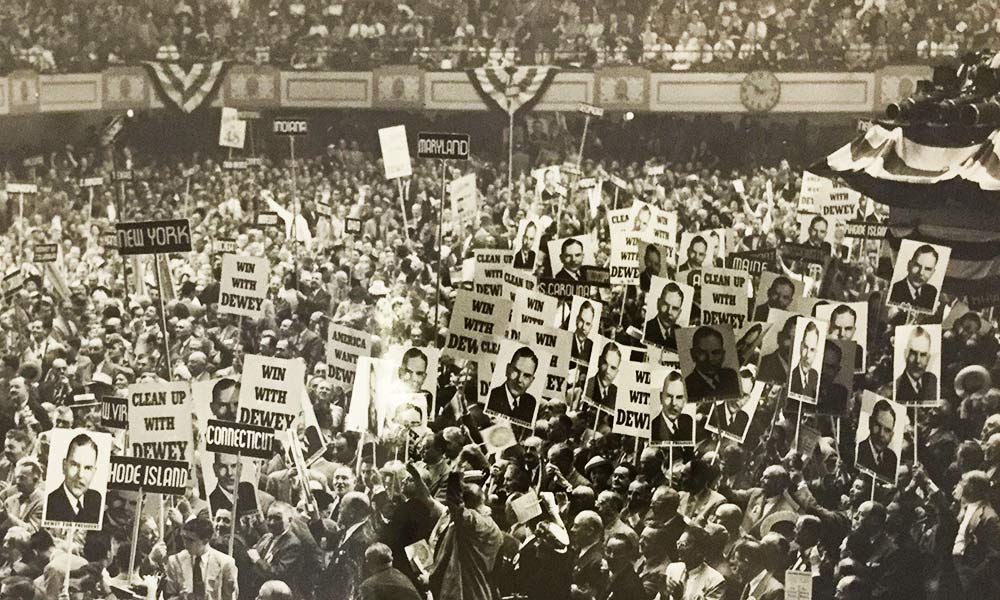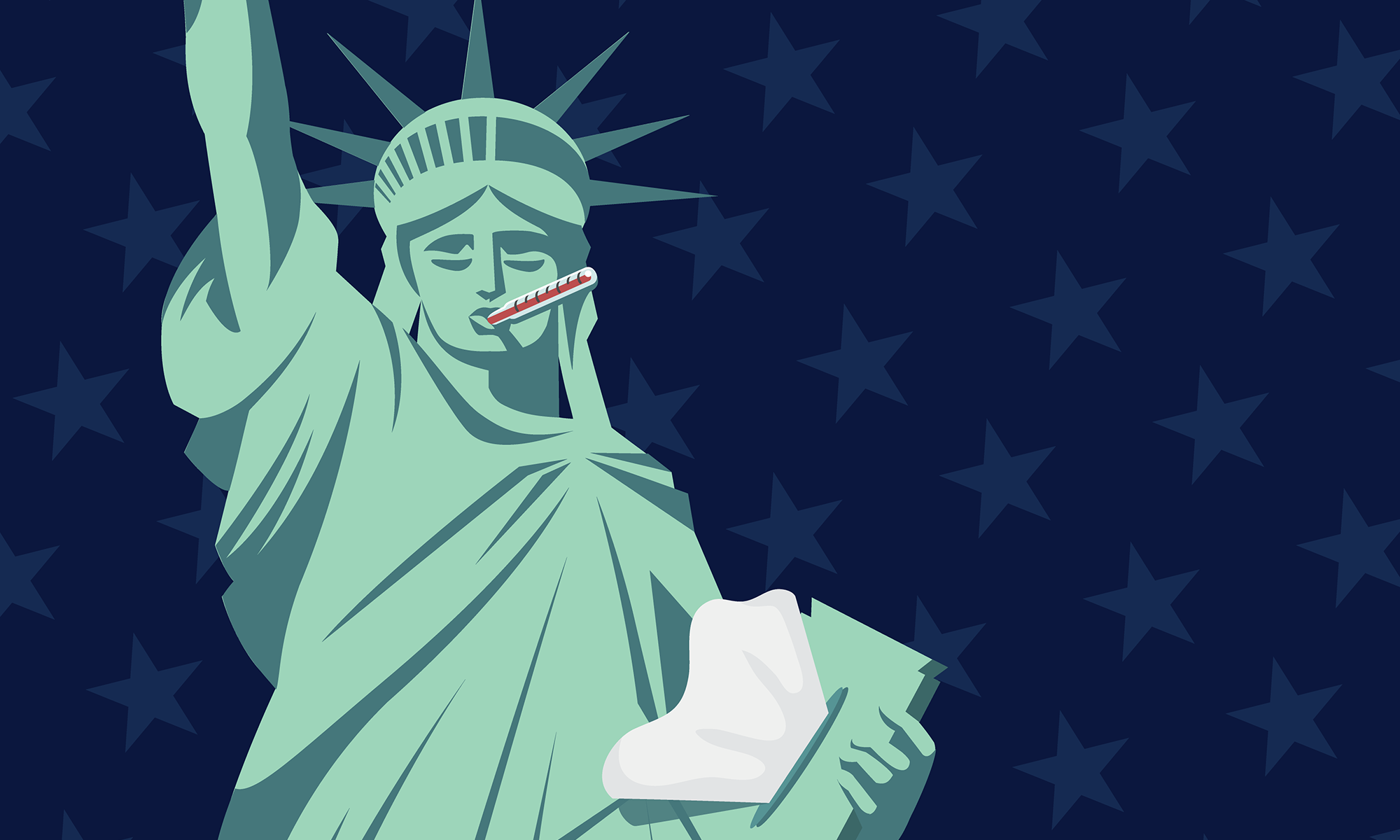Thomas Dewey was never president of the United States, despite what the headlines said. But he was the Republican Party’s candidate in 1944 and 1948 and the Governor of New York from 1943 to 1955. Sadly, though, he’s best known for losing an election a major newspaper said he had won.
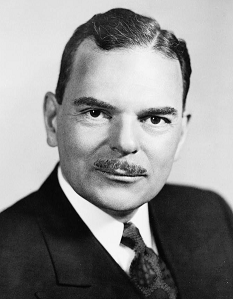
When the Republican National Convention opens in Cleveland on Monday, Quicken Loans Arena will be flooded with signs, buttons, and other memorabilia proclaiming Donald Trump as the next president of the United States.
Dewey’s extensive collection was a gift from him to the University in 1954 and is housed in the department of Rare Books, Special Collections and Preservation at the University’s Rush Rhees Library. Included are letters, photographs, phonograph recordings of his numerous speeches, his educational degrees, campaign buttons and slogans, and newspaper articles. And all are available for research by the public.
There is even an audio recording of Dewey’s 1948 acceptance speech at the Republican National Convention, taped June 25, 1948, at the Municipal Auditorium in Philadelphia. Just over 14 minutes long, it is short by modern standards.
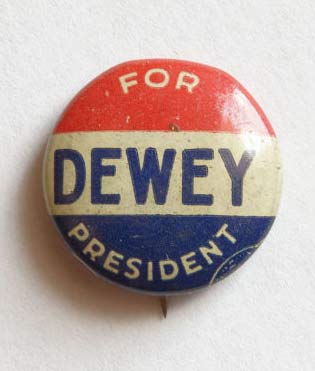
“I thank you with all my heart for your friendship and your confidence,” Dewey told the crowd in Philadelphia. “I am profoundly sensible of the responsibility that goes with this nominiation, I pray God that I may deserve this opportunity to serve this country. In all humility, I accept the nomination.”
Glyndon G. Van Deusen, a professor in the Department of History at the University, had first approached Dewey about his papers in 1950. Dewey’s interest may have been sparked by the fact that the University held the papers of former New York governor William Henry Seward. Van Deusen was invited to examine Dewey’s materials in Albany, but discussions faded when Dewey decided to run for re-election as governor. When Dewey decided not to run in 1954, Van Deusen reminded him of the earlier negotiations, and Dewey gave his consent. The collection, weighing 12 tons, was carefully moved to Rush Rhees Library in December 1954.
The Thomas E. Dewey Papers were considered a milestone for Rush Rhees Library. It was the first time a document collection of material dealing with the contemporary political scene was acquired by the University, and it was by far the largest single group of manuscripts added to the library.
Forgotten legacy?
The names of former presidents Abraham Lincoln and Ronald Reagan are sure to be invoked in Cleveland next week. It’s unlikely Dewey’s name will be uttered, yet the Michigan native played a major role in politics during the middle of the 20th century.
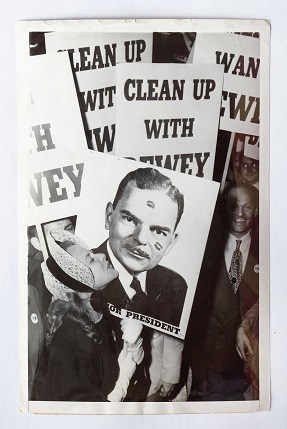
Dewey first gained national attention in the 1930s as a chief prosecutor against organized crime, netting 72 convictions in 73 prosecutions. He was such a threat that mob leaders placed a $10,000 bounty on his head.
He was an early favorite to represent the Republicans in the 1940 presidential race, but his youth (he was only 38) and non-interventionist stance in World War II worked against him. Wendell Willkie was nominated instead and lost in a landslide to incumbent Franklin Roosevelt. The events of the war caused Dewey to switch his position on international affairs from isolationism to one of international cooperation, and that turnabout helped him secure the 1944 Republican nomination. He was soundly defeated by Roosevelt in the Electoral College, 432 to 99, but fell three million votes shy in the popular vote, in the closest race of Roosevelt’s four presidential elections.
Dewey led the progressive faction of the Republican Party, and many of his policies today would be considered liberal. He supported many of Roosevelt’s New Deal social-welfare reforms and, while governor, he doubled state aid to education, increased salaries for state employees (while reducing the state’s debt by more than $100 million), put through the first state law prohibiting racial discrimination in employment, signed legislation creating the State University of New York, and played a major role in securing funding for the 570-mile New York State Thruway, which is named in his honor.
In 1948, Dewey was the heavy favorite to defeat incumbent Harry Truman for the presidency, so much so that the Chicago Daily Tribune infamously printed a front-page headline, DEWEY DEFEATS TRUMAN, on election night and issued hundreds of copies before the returns showed that Truman had indeed won.
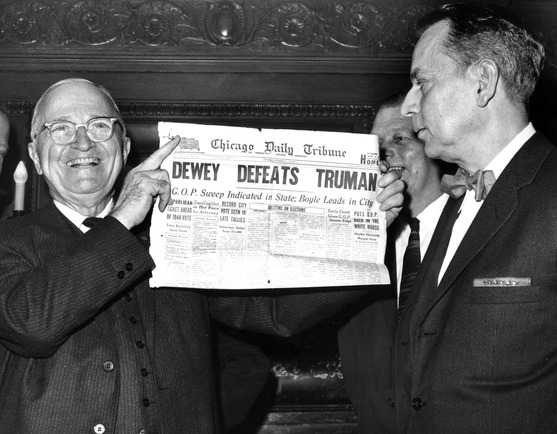
A black-and-white photo of a smiling Truman holding up that erroneous newspaper is iconic in American political history and popular culture.
Dewey did not seek the presidential nomination in 1952, but as leader of the Eastern Republicans, he played a major role in securing the Republican nomination for General Dwight D. Eisenhower and helping California Senator Richard Nixon become Eisenhower’s running mate. That tandem served for eight years, and Nixon served an additional six years as president.
Dewey had a chance to return to the national stage in 1968 but declined an offer from Nixon to be nominated as Chief Justice of the Supreme Court, citing his age. He died of a massive heart attack in Miami on March 16, 1971, following a round of golf with future Hall of Fame baseball player Carl Yastrzemski. He was eight days shy of his 69th birthday.
Rush Rhees Library also houses collections of social reformers Frederick Douglass and Susan B. Anthony and 19th century New York publisher and Whig politician Thurlow Weed, among others.


